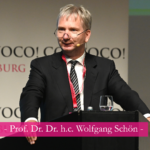The forthcoming Convoco Edition investigates the stability of our systems in times of emergency. Read here excerpts on what makes today’s experience of crisis different, and how we can mobilize the resilience of democracy.
Why the Experience of Crisis is Different Today

(1) There is now a global communications network that enables an unprecedented feeling of being a “contemporary eyewitness.” This applies both quantitatively and qualitatively when it comes to social media, and it has, for example, massively changed the global perception of victims and experiences of violence. Social media turns globalism into a mode of constant comparison. It contributes to the emergence of competing public spheres where opinions can be mobilized at any moment. In this context, the traditional separation between domestic and foreign policy seems to be pushed increasingly into the background.
(2) We are currently dealing with an unprecedented collision of long-, medium-, and short-term crisis phenomena. Following Fernand Braudel, we might identify three levels of “temporality” in the crises that are currently converging: the longue durée of climate, environment, and geography; the moyenne durée with regard to demographics and economic cycles; and the level of évènements in immediate political decision-making processes. All three temporal levels are intertwined in the present and reinforce each other. On top of this there are the costs of the Anthropocene resulting from the twin crises of climate and biodiversity and in light of the foreseeable end of the age of fossil fuels; the demographic crisis and its implications for the future of democracy and the welfare state; digitalization and the technological change accelerated by artificial intelligence that is creating completely new opportunities and threats for political communication and social conflicts; an erosion of traditional political and social systems through the increased polarization of globalization’s apparent “winners” and “losers”; and a crisis-like upheaval in the structure of the “outside” and “inside” of states and societies, with the result that the traditional context of sovereignty defined by nation states seems to be eroding, provoking even more aggressive kinds of nationalism in response.

Something is different and new. And this different and new thing is climate change and its influence on the entirety of systems in terms of economy, society, and politics. World history—to use a lofty term—has seen the rise and fall of great empires, the shift from democracy to autocracy (or anarchy) and vice versa, as well as a succession of periods of cultural or economic prosperity. But at no time in the recorded history of our planet has a global natural phenomenon shaken in such a short space of time the robust framework within which government, economy, and culture traditionally develop. It’s no longer just about the traditional interplay of forces, about the ups and downs of states and cultures. It’s about the playing field itself becoming unhinged, being subject to seismic shifts, and becoming completely unreliable.

The Anthropocene brings a challenge to modern thinking and ontology. Two core ideas of modern thinking are questioned in particular: the idea of a separation between humans/culture and nature, as mentioned above, and the idea of linearity and simple causality in human action and in politics. Instead, we have to face the fact that all life on the planet functions in complex systems and entanglements that models of causality and linearity fail to grasp. In sum, the Anthropocene refers to a changing global, human, and natural condition that challenges modern conceptions of both knowledge and agency.
The Mobilizable Resilience of Democracy
Jörn Leonhard: From a German perspective, we are basing our view of the years around 1930 on the experiences from the Weimar Republic. But by choosing a different focus—for example, on the United States, Great Britain, and the Netherlands—this historical period also contains many of the conditions needed for the resilience of democracy to mobilize and to succeed.
From an overarching perspective, the survival of democracy depended on three interconnected factors: cleverly constructed institutions that people trusted; transparent political decisions; and moderation in the practical interactions between the system’s representatives. In this example, decidedly pre-political attributes—empathy, trust, moderation, solidarity, justice, patience, the ability to compromise—were of enormous importance.
An examination of these examples from the 1920s and 1930s warns us not to assume from our present-day accumulation of crises that democracy is no longer able to meet the demands of political and social governance and that a crisis of democracy is therefore unavoidable. A case of emergency is always also an opportunity that recalls the fundamentally open meaning of “crisis”—not as a negative characterization of an event, but as a decision-making phase whose outcome is open

